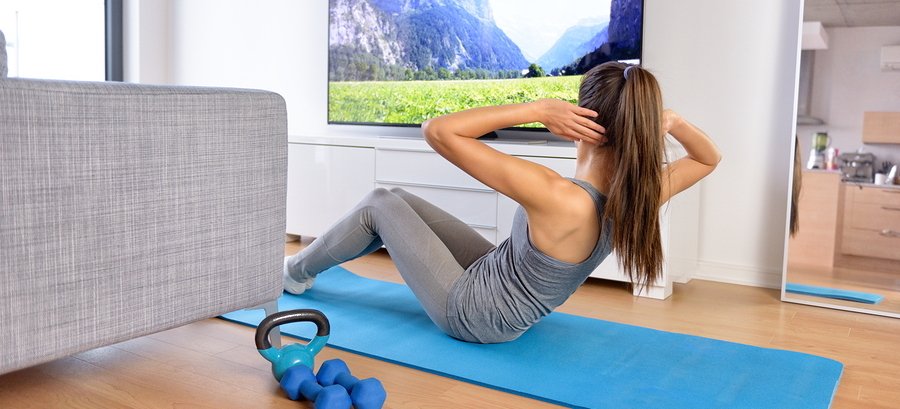So you join a new gym, and you’re feeling really excited about your decision…until you start attending workout classes and everyone there is super fit and can execute all the routines perfectly. Or maybe you recently started working in a new office where everyone else seems to exercise all the time and be in the best shape, making your 14-minutes-a-day on your Bowflex Max Trainer seem paltry in comparison. While these feelings might be frustrating, try not to give up or let negativity get the best of you because it can take a serious toll on your health. New research suggests that simply feeling like you’re not working out enough can reduce your life expectancy.
The study, which took place at the Stanford University Graduate School of Business in California, found that feeling less fit than the people close in age around you may increase your risk of an earlier death.1 Zahrt, Octavia H. and Crum, Alia J. “Perceived Physical Activity and Mortality: Evidence From Three Nationally Representative U.S. Samples.” Health Psychology. 20 July 2017. Accessed 23 July 2017. http://content.apa.org/search/display?id=25f936a4-5898-97d9-686b-b69efb4021fa&recordId=1&tab=PA&page=1&display=25&sort=PublicationYearMSSort%20desc%2CAuthorSort%20asc&sr=1. These results were based on data from the National Health Interview Survey and the National Health and Nutrition Examination Survey, two large, long-term investigations.
All of the volunteers provided information on their physical activity levels, weight, and how their exercise routines would rate against those of their peers. The subjects were analyzed in smaller groupings based on similar characteristics beyond age, such as the length of their workouts both as reported by them and through step-tracking devices, cardiovascular health, and weight. Those who considered themselves to be less active than others their age faced a greater chance of dying no matter what their body mass index or other measures of health.
Three sets of data from the surveys were examined, and all three showed that those who believed they worked out less than others their age had a greater chance of dying over the course of the 21 years they were tracked than those who believed they exercised more than others their age. The effect varied in intensity between the three data sets, but in one it was a whopping 71 higher likelihood of mortality. The only factor that was predictive of early mortality was the belief that they exercised less than others.
While the research doesn’t give us any answers as to why our feelings about our physical activity level can be harmful if they’re negative, there are several possible dynamics that may be influencing this. One is that it could be a sort of self-fulfilling prophecy. In other words, if you start thinking that you’re not doing enough, you’ll grow discouraged and over time actually work out less, which could contribute to illness and earlier death eventually.
Another possibility is that your body might react physically to the belief that you’re not exercising enough, as a placebo-effect reaction. Your belief may be strong enough to start changes in motion physically. This is very much in line with Jon Barron’s explanation of “The Thought That Kills,” to which a chapter is devoted in his book Lessons From the Miracle Doctors.
And further evidence of this was shown in a 2007 study at Harvard University in Cambridge, Massachusetts in which the participants were hotel workers with strenuous, physically active jobs.2 Crum, AJ and Langer EJ. “Mind-set matters: exercise and the placebo effect.” Psychological Science. February 2007. Accessed 24 July 2017. http://www.ncbi.nlm.nih.gov/pubmed/17425538. They believed, however, that they did little exercise because what they were doing at work wasn’t a traditional workout. But when it was explained to them and then a follow up took place a month later, those who began to perceive their work as actual exercise were found to have lower blood pressure and a decrease in body fat.
Ultimately, it’s all about carving out some time for yourself to exercise every day, whether it’s formal exercise or not, and then developing a positive frame of mind about it. That means if you skip a day or only do a portion of your typical workout, don’t beat yourself up about it. Try not to compare yourself to others who are training for marathons or can swim 50 laps—or even what you “think” everybody else in the office is doing. Focus on how much better you’re doing than you used to be doing and how good it makes you feel, and you will truly be able to get all of the benefits of exercise for your mind and body.
References
| ↑1 | Zahrt, Octavia H. and Crum, Alia J. “Perceived Physical Activity and Mortality: Evidence From Three Nationally Representative U.S. Samples.” Health Psychology. 20 July 2017. Accessed 23 July 2017. http://content.apa.org/search/display?id=25f936a4-5898-97d9-686b-b69efb4021fa&recordId=1&tab=PA&page=1&display=25&sort=PublicationYearMSSort%20desc%2CAuthorSort%20asc&sr=1. |
|---|---|
| ↑2 | Crum, AJ and Langer EJ. “Mind-set matters: exercise and the placebo effect.” Psychological Science. February 2007. Accessed 24 July 2017. http://www.ncbi.nlm.nih.gov/pubmed/17425538. |











